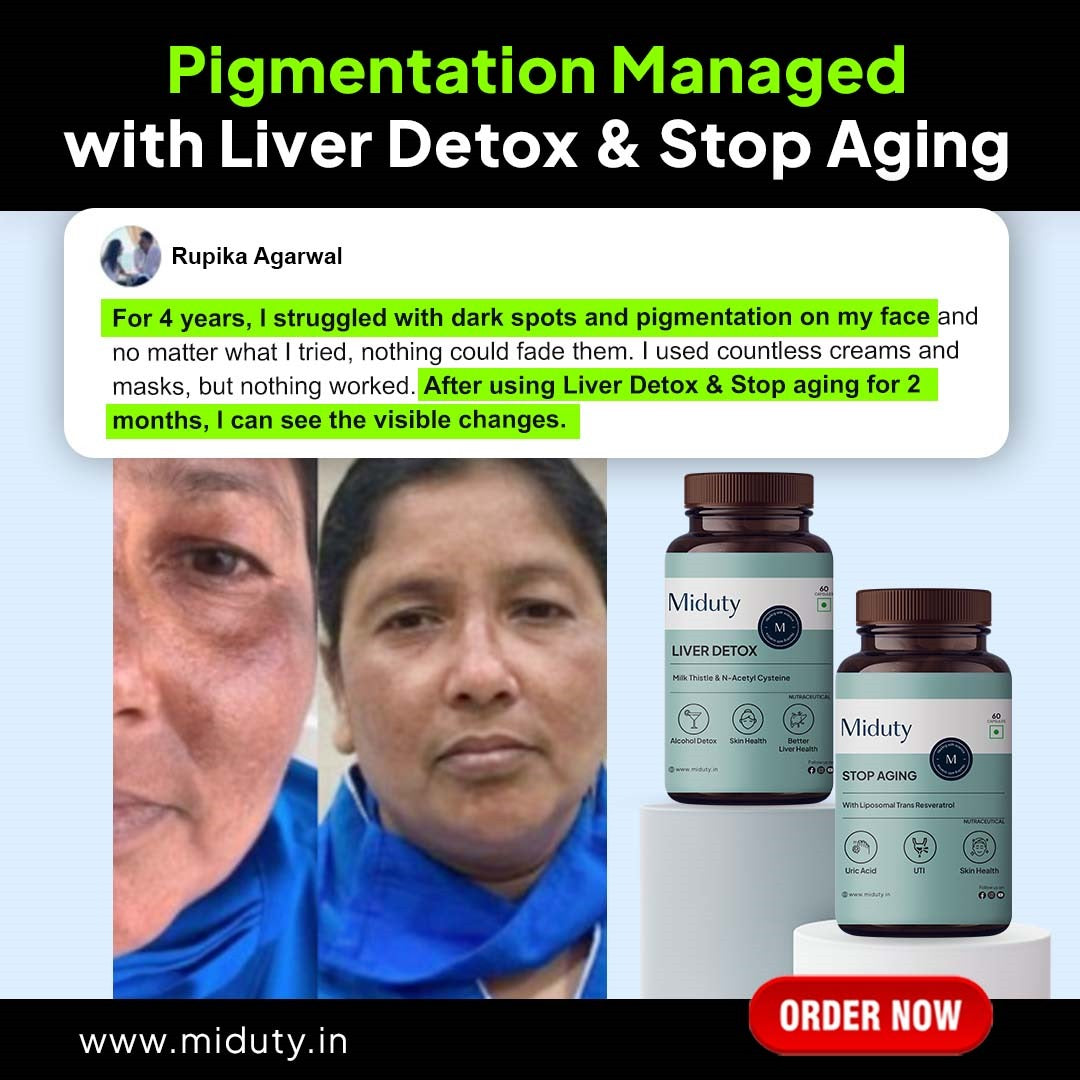




Nutritionist Recommended Brand

Sticks Consumed

Proven results

Licensed






This clinically researched combination helps balance hormones naturally without side effects, unlike over-the-counter hormonal medicines that contain artificial hormones.

The efficiency of milk thistle depends on the percentage of silymarin in it, and we use 80% silymarin, which has the highest strength.

Miduty's Liver Detox is formulated with maximum bioavailability of NAC and Milk Thistle, ensuring that they are efficiently absorbed and utilized by the body.
Fibroids are often more prevalent during the childbearing years when hormone levels are elevated. However, they typically diminish in size after menopause, as hormone levels decline.
One of the fibroid causes are Xenoestrogens, parabens, and chemicals found in cosmetics and cleaning products that can disrupt hormones, contributing to estrogen dominance in the body.
Excessive consumption of red meat and processed foods can elevate the risk of fibroids. Additionally, lack of physical activity and heightened stress levels may also play a role in their development.
Obesity or being overweight increases the risk of fibroids. Excess fat tissue can generate and store estrogen, thereby contributing to hormonal imbalances associated with fibroids.
Avoid unnecessary use of hormone-containing medications like birth control pills or hormone replacement therapy, as they may increase the risk of fibroids. This all can worsen your condition, in the long run, can mess with your hormones, and can result in symptoms like tiredness, altered appetite, mood swings, breast tenderness, poor liver function, disturbed sleep patterns, sadness, low libido, and even depression.
Processed and packaged foods contain additives, preservatives, and artificial ingredients that disrupt hormone balance and health. High in unhealthy fats, sugars, and refined carbs, they fuel inflammation and weight gain, worsening fibroid symptoms.
Address and manage hormonal conditions such as polycystic ovary syndrome (PCOS) and insulin resistance, as they can increase the risk of fibroids.
Compounds known as xenoestrogens are substances that are present in many common goods, including creams, lotions, soaps, shampoos, fragrances, hair sprays, and room deodorizers. These substances frequently function like estrogen and have chemical structures that are comparable to estrogen and can affect estrogen levels in the body.
Fibroids located within the uterine cavity or near the uterine lining can cause heavy or prolonged menstrual bleeding. Heavy menstrual bleeding associated with fibroids can lead to iron-deficiency anemia due to blood loss.
Larger fibroids or those pressing on surrounding organs can cause pelvic pain, discomfort, and pressure.
Submucosal fibroids (that develop in the inner lining of the uterus, known as the endometrium) can interfere with implantation and lead to infertility or recurrent miscarriages. Also, Fibroids can increase the risk of pregnancy complications such as preterm labor, breech presentation, or cesarean delivery.
Fibroids may press on the rectum or intestines, resulting in constipation, bloating, or difficulty with bowel movements. Additionally, fibroids pressing on the bladder can cause frequent urination, urgency, or difficulty emptying the bladder.
Incorporate healthy fats like coconut oil, butter, desi ghee, or avocado oil into your diet. These fats are essential for hormone production and maintaining normal hormone function. They also help rebuild cells and stabilize hormones, including the fats found in sources of omega-3 fatty acids.
Consume cruciferous vegetables such as cabbage, broccoli, cauliflower, mustard greens, and Brussels sprouts into your diet. These veggies contain DIM, a compound known to reduce excess estrogen levels and support liver function. By promoting the elimination of harmful estrogen, DIM helps maintain a healthier balance of estrogen levels, which may benefit fibroids treatment.
High-fiber foods such as soaked seeds for seed cycling – chia seeds, flax seeds, sesame seeds, pumpkin seeds, vegetables (including avocado), nuts, and legumes/beans into your diet. These foods may help lower estrogen levels and alleviate fibroid symptoms associated with estrogen dominance.
Get enough sleep One of the worst habits that can lead to an imbalance in hormones is sleep deprivation. Increased morning cortisol levels, lowered immunity, hormonal changes, difficulty concentrating at work, and a higher tendency for anxiety, weight gain, and depression are all associated with excessive stress and poor sleep.
Remember that everyone's experience with fibroids is different, and what works for one person may not work for another. Treating fibroid symptoms is crucial for balancing hormones and addressing the underlying problem.No, birth control pills have a lot of side effects on the body like breast tenderness, elevated blood pressure, headache, nausea, bloating, etc.
You can take liver detox and Probiotics & Prebiotics Fiber but not estrogen balance as of now. Multiple hormonal treatments at a time can lead to adverse effects on the body. Also, you should avoid excessive use of artificial hormonal pills.
Adopting a diet rich in – low carbohydrates and healthy fats, along with dietary supplements to address nutritional gaps and balance hormones naturally, combined with regular physical exercise, constitutes an effective natural approach to managing fibroids. For more information, feel free to reach out to us at 86990-86991.
Are you constantly questioning why you're experiencing bloating, heavy periods, or pelvic pain? Do you find yourself dealing with heavy menstrual bleeding that leaves you feeling drained and exhausted? Or perhaps you've noticed an increase in pelvic pressure or discomfort that just won't go away.
If so, you're not alone. These signs might indicate that fibroids are present in your uterus, affecting your daily life. Many women experience these challenges regularly, often without knowing what's causing them.
From disrupting your menstrual cycle to causing discomfort and even impacting fertility, these little troublemakers can make life feel like an uphill battle.
Fibroids are non-cancerous growths that form in the uterus. They're made of muscle and fibrous tissue and can be small or large. Fibroids are common, especially during childbearing years, and can affect up to 80% of women by the age of 50.
While many women with fibroids may not experience any symptoms, others may have fibroid symptoms such as:
While the exact cause of fibroids is not fully understood, estrogen is known to stimulate their growth. During the menstrual cycle, estrogen levels rise, stimulating the uterine lining to thicken in preparation for a possible pregnancy. If there is excess estrogen and insufficient progesterone to balance it out, this can lead to overgrowth of the uterine lining, contributing to the development of fibroids.
Additionally, estrogen dominance is associated with other factors that may promote fibroid growth, such as obesity, exposure to environmental toxins (xenoestrogens), and certain dietary factors.
Therefore, high levels of estrogen fuel the growth of fibroids, making estrogen dominance a factor in their formation and progression.
Are you constantly questioning why you're experiencing bloating, heavy periods, or pelvic pain? Do you find yourself dealing with heavy menstrual bleeding that leaves you feeling drained and exhausted? Or perhaps you've noticed an increase in pelvic pressure or discomfort that just won't go away.
If so, you're not alone. These signs might indicate that fibroids are present in your uterus, affecting your daily life. Many women experience these challenges regularly, often without knowing what's causing them.
From disrupting your menstrual cycle to causing discomfort and even impacting fertility, these little troublemakers can make life feel like an uphill battle.
Fibroids are non-cancerous growths that form in the uterus. They're made of muscle and fibrous tissue and can be small or large. Fibroids are common, especially during childbearing years, and can affect up to 80% of women by the age of 50.
While many women with fibroids may not experience any symptoms, others may have fibroid symptoms such as:
While the exact cause of fibroids is not fully understood, estrogen is known to stimulate their growth. During the menstrual cycle, estrogen levels rise, stimulating the uterine lining to thicken in preparation for a possible pregnancy. If there is excess estrogen and insufficient progesterone to balance it out, this can lead to overgrowth of the uterine lining, contributing to the development of fibroids.
Additionally, estrogen dominance is associated with other factors that may promote fibroid growth, such as obesity, exposure to environmental toxins (xenoestrogens), and certain dietary factors.
Therefore, high levels of estrogen fuel the growth of fibroids, making estrogen dominance a factor in their formation and progression.
